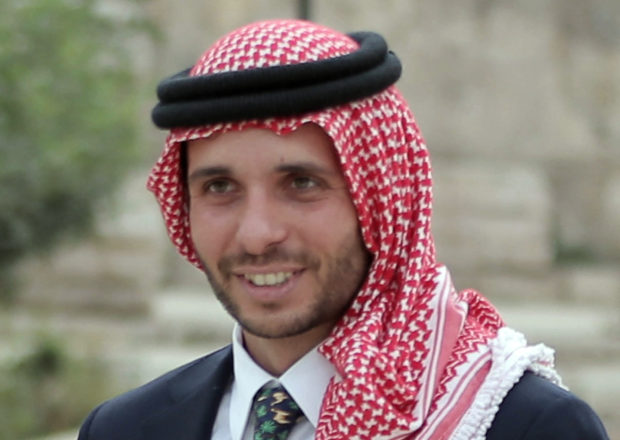Jordan’s Prince Hamzah strikes defiant tone amid palace turmoil

(FILES) In this file photo taken on September 09, 2015, shows Jordan’s Prince Hamzah Bin Al-Hussein attends a press event in Amman where Prince Ali announced his bid to succeed FIFA president Joseph Blatter. – A top former Jordanian royal aide was among several suspects arrested on April 3, 2021, as the army cautioned Prince Hamzah bin Hussein, the half-brother of King Abdullah II against damaging the country’s security. Hamzah is the eldest son of late King Hussein and his American wife Queen Noor. He has good relations officially with Abdullah and is a popular figure close to tribal leaders. (Photo by KHALIL MAZRAAWI / AFP)
Amman, Jordan — Jordan’s Prince Hamzah, accused of a “wicked” plot against his elder half-brother King Abdullah II, has struck a defiant tone, insisting he will not obey orders restricting his movement.
The government has accused Hamzah of involvement in a seditious conspiracy to “destabilize the kingdom’s security,” placed him under house arrest, and detained at least 16 more people.
But 41-year-old Hamzah, who says he has been ordered to stay inside his Amman palace, vowed he would defy orders limiting his movement and communications, in an audio recording posted on Twitter late Sunday.
“I don’t want to make moves and escalate now, but of course I’m not going to obey when they say you can’t go out, you can’t tweet, you can’t communicate with people, you’re only allowed to see your family,” he said.
Hamzah — a former crown prince who was stripped of that title by Abdullah in 2004 — has emerged as a vocal critic of the monarchy, accusing Jordan’s leadership of corruption, nepotism, and authoritarian rule.
Article continues after this advertisementIn a video he sent to the BBC Saturday he bemoaned “incompetence that has been prevalent in our governing structure for the last 15 to 20 years and has been getting worse.”
Article continues after this advertisementHe charged that “no-one is able to speak or express opinion on anything without being bullied, arrested, harassed and threatened.”
‘Wicked slander’
Hamzah denied being involved in any “nefarious” plot but said he had been placed under house arrest, with his phone and internet cut, by Jordan’s military chief, General Youssef Huneiti.
In the recording released Sunday, Hamzah said that “when the head of the joint chiefs of staff comes and tells you this … I think it’s kind of unacceptable.”
He added that when Huneiti visited his home, “I recorded what he said and sent it to my friends abroad and to my family, in case anything happens.”
King Abdullah, 59, named Hamzah crown prince in 1999, in line with their father’s dying wish, but stripped him of that title five years later and named his own son Prince Hussein, now 26, heir to the throne.
Hamzah’s mother, American-born Queen Noor, defended her son, tweeting that she was “praying that truth and justice will prevail for all the innocent victims of this wicked slander.”
Jordan’s official Al-Rai daily said in an editorial Monday that the country “has avoided a chapter of unrest thanks to the expertise of the Jordanian leadership and security services.”
It blamed Hamzah, arguing that “the king tried to solve some problems within the Hashemite family, but his brotherly desire to solve the problem … was not received positively.”
Analyst Ahmad Awad said that the events were “a first” in Jordan’s history.
“This is the beginning of a crisis and not the end,” said the head of the Phenix Center for Economic and Informatics research institute in Amman.
“This shows that there is a need for political, economic, and democratic reforms.”

Jordanian Prince Hamzah bin al-Hussein (R) and Prince Hashem bin al-Hussein attend the opening of the Special Operations Forces Exhibition and Conference (SOFEX) in Amman on May 10, 2016. (Photo by KHALIL MAZRAAWI / AFP)
Linchpin of stability
The crisis has laid bare divisions in a country usually seen as a bulwark of stability in the Middle East.
Washington, major Gulf powers, Egypt, and the Arab League were all quick to pledge their support for Abdullah and all his steps to ensure stability.
Jordan has only 10 million people but outsized strategic importance in a turbulent region. It borders Israel and the occupied West Bank, Syria, Iraq, and Saudi Arabia.
It hosts US troops and is home to millions of exiled Palestinians and more than half a million Syrian refugees.
The Washington Post had first reported Saturday that Hamzah had been “placed under restriction” amid a probe into an alleged plot.
“This sedition was nipped in the bud,” Jordan’s foreign minister and deputy premier Ayman Safadi said Sunday, charging that the plotters had linked up with foreign parties “to carry out wicked plans aimed at destabilizing” the kingdom.
Among those arrested were a former finance minister, Bassem Awadallah, who was chief of the royal court in 2007-2008, and Sherif Hassan bin Zaid, a junior member of the royal family.
Safadi declined to identify the alleged foreign parties, but said authorities acted because the alleged conspirators were “talking about timing.”
He also charged that an individual “with links to foreign intelligence services” had offered to spirit Hamzah’s wife out of the country by plane.
An Israeli who said he is a close friend of Hamzah, Roy Shaposhnik, said in a statement he had indeed “extended an invitation for the prince’s wife and children to stay at his home in Europe.”
He said he had made “this benign, humanitarian” offer after the prince had described a “dynamic situation in Amman” and voiced “concerns about the safety of his family.”
Shaposhnik stressed that he had “never served in any capacity with any intelligence branch in Israel or any other country for that matter” and that he had “no knowledge of, or any involvement with, events that are allegedly transpiring in Jordan.”